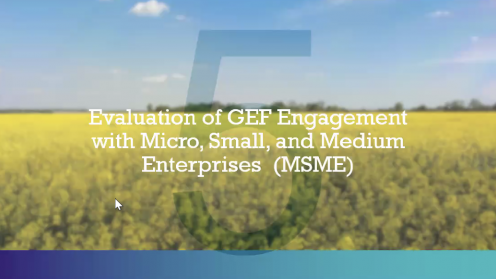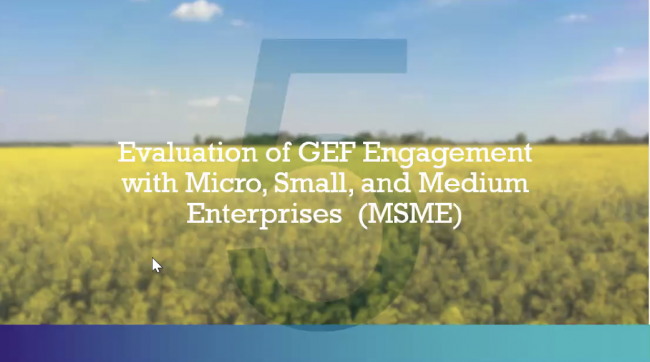On Tuesday, 15 June, the Council focused on a set of evaluations prepared by the GEF Independent Evaluation Office (IEO). Council Members were reminded that the evaluations will serve as inputs to the IEO’s Seventh Overall Performance Study (OPS) of the GEF and will help inform the GEF-8 replenishment talks. The IEO presented all seven reports, and the GEF Secretariat delivered its responses to each. Council Members discussed three, adopting decisions on the Small Grants Programme (SGP) and Country Support Program (CSP). Discussions on the other evaluations will continue on Wednesday.
Opening the discussion, Council Elected Chairperson Møglestue reminded Members that the Council decided at its last meeting to shift the focus of its decisions on IEO evaluations from endorsing the reports to considering whether to endorse management responses by the GEF Secretariat.
In its evaluation of the SGP, IEO recommendations included updating the long-term vision, analyzing the funding impacts of adding countries to the Programme, improving the approach to and measurement of sustainability in the SGP, and reviewing and re-energizing governance. The Secretariat said it is working on these issues and will provide inputs to the GEF-8 replenishment talks. Council Members supported the recommendations, with many urging expansion of the SGP under GEF-8. The Council adopted a decision endorsing the GEF Secretariat’s management response.
In its evaluation of the CSP, the IEO recommended increasing collaboration with other global environmental funds, developing a clear strategy and implementation plan, enhancing inclusiveness, and applying customized capacity building. The Secretariat said it is working on these issues, will provide appropriate inputs to the GEF-8 replenishment talks, and will present to the June 2022 Council session a paper on capacity building. Council Members called for more synergies with other funds and the conventions the GEF serves, and stressed the need to enhance the role of Operational Focal Points (OFPs). The Council adopted a decision endorsing the GEF Secretariat’s management response.
The evaluation of GEF integrated approach programs called for clarifying program-level reporting requirements for lead Agencies, further catalyzing and demonstrating the value addition of a programmatic approach to integration, and diversifying the countries included in integrated programs. The Secretariat said work in line with IEO recommendations is underway and will factor into GEF-8. He noted that 11 Impact Programs (IPs) are proposed for GEF-8, including one on green and blue recovery for small island developing States. During Council debate, several Members supported an amendment to the draft decision. A final decision was delayed until Wednesday to allow Members time to consider the amendment.
Regarding the evaluation of GEF engagement with micro, small, and medium enterprises (MSMEs), the IEO found that MSMEs sometimes do not continue participating in interventions due to insufficient follow-up technical and financial support. The Secretariat agreed with the evaluation’s recommendations to bolster such support.
The IEO evaluation of GEF support to innovation found that GEF integrated projects commonly incorporate innovation but it is not necessarily correlated with higher outcomes or sustainability risks. The IEO recommended continuously monitoring risk, requiring monitoring and evaluation and mid-term reviews (MTRs) in all innovative projects, and partnering to mobilize more capital. The Secretariat responded that innovation evaluation must have greater impact for systemic change, and noted cross-linkages between these findings and those of other evaluations being presented.
Regarding the evaluation of GEF institutional policies and engagement, the IEO recommended: tying together policies on stakeholder engagement, gender equality, and environmental and social safeguards under an “inclusion” rubric, and stressing their complementarities and contribution to the GEF program; resetting the GEF’s relationship with the CSO Network; and recalibrating the Indigenous Peoples Advisory Group mechanism. The Secretariat agreed with the evaluation’s findings, saying it is focused on improving processes and may play a greater role as a “relation broker” with partners, including in knowledge sharing and capacity development.
The final IEO evaluation presented looked at both the GEF Agency self-evaluation systems and the GEF portal. On the former, the IEO called for strengthening the use of MTRs by the Secretariat and Agencies and for strengthening learning systems and cross-Agency exchanges. On the portal, the IEO recommended improving user feedback mechanisms and a time-bound plan to speed up the portal’s development. The Secretariat responded by proposing to reinforce guidance on evaluating good practice, adaptive management, and problem solving in MTRs and to review MTRs with greater country engagement and monitoring of timely submission. The Secretariat also proposed to enhance incentives for candor in self-evaluation, better capture lessons learned, identify gateways for sharing these across the partnership, and host knowledge-sharing events on better tools for self-assessment.
To receive continuing coverage of this event delivered to your inbox, subscribe to the ENB Update newsletter.












